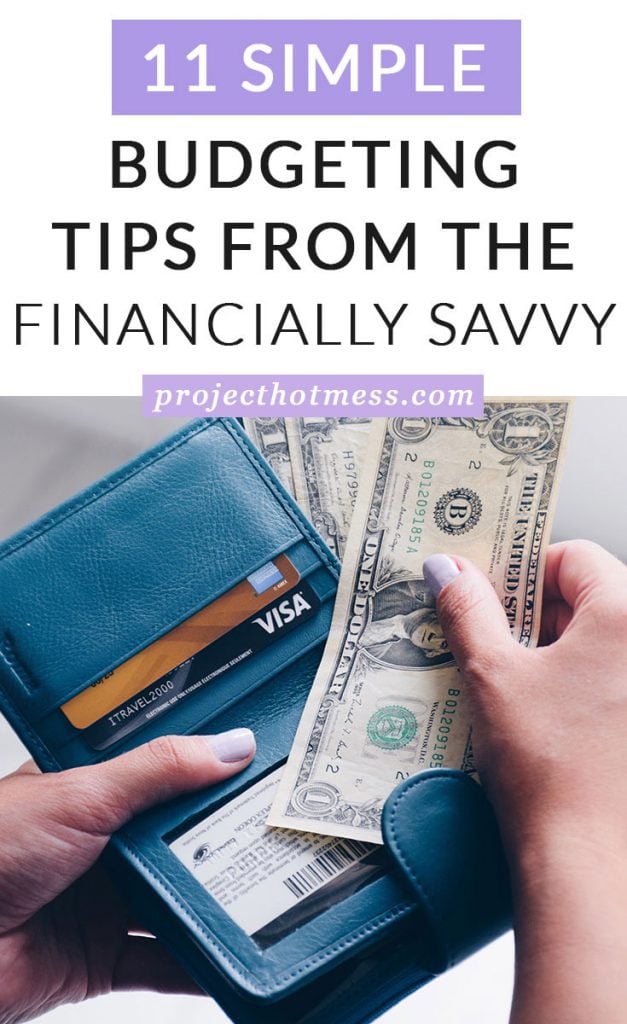11 Simple Budgeting Tips From The Financially Savvy
When it comes to budgeting, people usually fall into one of two camps. They get so excited, love crunching the numbers and seeing their money work for them, create spreadsheets or use pretty planners, and are giddy at the thought of the numbers adding up perfectly (wait… is that just me?) or they feel that budgeting is a dirty word, usually reserved for those who are on a low income or have a lot of debt.
But here’s the thing… neither of the above statements are completely true.
You may not be in love with budgeting (that’s okay…) but I believe absolutely everyone needs a budget. And here’s why:
Your personal finances should be running at a profit. Just like a successful business. But.. you cannot possibly run at a profit if you don’t manage the money.
So, don’t fear budgets. Don’t avoid budgets. Learn more about them (that’s why you’re here right?) and make them work for you!
We managed to pay off over $120k in debt in under 3 years, and purchase our home 6 months later thanks to budgeting. We had to get financially savvy to make it happen, but it’s totally possible.
Here are some simple budgeting tips to get you started and on your way to budgeting success.

1 – Find What Works For You
Some people swear by the 70/20/10 rule of budgeting, others swear that using cash is the only way to go. I find neither work for me so I figured out what did work for my family and our situation and we stick with it.
It’s okay if a budgeting style isn’t giving you the confidence and results you want. It just means that it’s not your thing.
Sometimes it might find a few trials to figure out what type of budgeting works for you. We all have different personalities, especially when it comes to money, and we all have different ways of learning or different ways things make sense to us. We aren’t all the same and that’s a good thing.
Personally, we use cards so I can keep track of every cent spent, and we budget all of our money, and we have a big chunk of spending money – far more than what is ‘recommended’ in a lot of budgets, because we want to enjoy our budget while still putting money towards our financial goals.

2 – Budget For Each Pay
You need two sections to your budget. Your ‘core’ budget is your fixed expenses. These are the things that don’t change from pay cycle to pay cycle and are the same amount each and every time. Things like your base mortgage repayments or rent, car payments, insurances, Netflix.
Then, you need to also have a ‘variables’ section of your budget. These are things that pop up and don’t carry over week to week. Things like birthdays, school events, weddings – or any other ‘thing’ that comes up that doesn’t fall into your core budget.
When you budget each pay cycle, you can take into account these variables and make sure you include them. That way they aren’t going to derail your budget, they aren’t going to mean you have to pull money from your savings and you can still make sure everything is paid and accounted for.
Use a budget template like this free printable one to help you:
3 – Be Honest and Include Everything
Lying on your budget is only going to hurt one person, you. You may not even realise you’re lying. Perhaps it’s more that you’re wishing you’d only spend x amount of money when in reality you spend twice that.
This usually is relevant in areas like grocery budgets. Sure, maybe you want to only spend $200 a week on your groceries, but if you’ve been spending $400 a week up until now, then cutting back to $200 is either going to take some serious dedication right now, or you need to work towards cutting it back to $200 bit by bit.
If you’re not realistic with the numbers, your budget just won’t work.
4 – Create A Bills Account
I like to keep things super simple. Some might call it lazy, others might call it clever… I just think it’s the simplest way and means I don’t have to think about as many things. And that is why we have a ‘bills account’.
A bills account is a separate bank account that we pay a set amount of money into each pay cycle and all of our bills are debited out of this account. We set up regular payments to things like our utility bills and phone bills, and we have things like Netflix, insurance payments and mortgage payments taken out of this account.
To make sure we have enough money put in there each pay, we sat down and worked out ALL of our bills, then worked out how much these expenses added up to over the year, and divided that to work out how much we needed to put into the account each pay. For example, we get paid every second week, so we took our yearly amount and divided it by 26 (because we get paid 26 times a year). Then we put that amount in the fixed expenses category of our budget.
This way all our bills are paid on time and we don’t have to worry about if we have enough money for the mortgage payment, or the insurance bills.

5 – Allow Enough ‘Spending’ Money
One of the reasons budgets fail is because people aren’t realistic with them.
It’s highly unlikely that you’d be able to budget a ‘zero spend’ budget, where you don’t allow yourself anything for spending money, and actually stick to it.
You need to be able to feel like you aren’t missing out with your budget otherwise you will simply quit. It’s nothing against you, it’s just how it works.
Be sure to give yourself enough spending money so you’re motivated to keep your budget going. If you love going out to the cafe once a week with your friends then budget for it.
Find other areas to cut back on if you want, but be sure to keep things in your budget that make you happy so you keep going with it.
One of my most favorite tools for managing and tracking my money is PocketSmith. It syncs all of our finances, including our loans and assets – which means it shows us our overall wealth. It’s also great for finding and tracking changes in our spending (so we can budget accordingly). I’ve tried so many different apps and this is the only one that I loved. PocketSmith is so easy to use and my husband loves how he can see how much we have left in our budget at anytime.

6 – Keep Your Financial Goals In Mind
Why are you creating a budget?
Are you wanting to save more money? For what?
Are you wanting to pay off debt? By when?
Creating financial goals means you always have something to work towards, which is so darn important, especially when it comes to money.
Work out what it is you want to achieve financially, then create an action plan to make it happen. And budget for it.
If you want to pay your debt off sooner, then you need to add extra debt repayments in your fixed expenses and make it happen. If you want to save money for an overseas trip, then budget for it and make it happen.
7 – Don’t Be Too Strict
It can be difficult to work out a balance between a strict budget where you reach your financial goals sooner, and one that is a bit more relaxed allowing you to enjoy the budget. You need to find the balance that works for you and it can be a bit difficult to figure it out.
You can mix it up between strict and relaxed too – just because you choose to be a little more relaxed, doesn’t mean you can’t challenge yourself as well.
Have a ‘no spend’ week, cut your budget for groceries in half and ‘shop your pantry’ by using up what you already have in the house. These are quick ways to boost your contribution to your financial goals, while still giving you the flexibility to go back to your ‘normal’ budget after your challenge week.
You could even make it a monthly thing, where you have one strict week a month and then 3 more ‘relaxed’ weeks.

8 – Get Rid Of Credit
If you want to stick to your budget and make it work, you need to get rid of your credit. Now.
Remember how we said that we want our personal finances to be profitable? If you’re using credit, then you’re going into more debt. Even if you pay it off, that debt is just being accumulated now to be paid off later. You don’t need to do that, no matter what excuse you have.
When you are budgeting and managing your money, there is no reason for credit. You can create an emergency account for any emergency that pops up, you know what your expenses are and you have money in your bills account to pay for them. You’re covered.
If you want something that is expensive, save up for it. Do not put it on credit.
Credit does not lead to achieving your financial goals.

9 – Save Money Where You Can
There are so many savvy and clever ways to save money, it honestly amazes me at ways people come up with to cut down their budgets.
Take a look at your core budget, your fixed expenses. Is there anything in there that you can save on? Do you need Netflix, Cable, Amazon Prime, Hulu and whatever else you’ve got going on?
There are heaps of different ways to save money – but some of my favourites are:
- Using eBates when shopping online. Install the browser extension and get cashback and updates on discount codes (hot tip – use it for groceries and anything you buy on Amazon!!)
- Having a $10 meal week. Meal plan so you only spend $10 each meal. It’s totally doable! Check out Pinterest for a ton of inspiration.
- Call your phone company and ask for a better deal. I did this a little while ago and managed to get more data and cut $20 a month off my bill!
Other simple things like looking at the price per kg or per lb when grocery shopping rather than the cheapest ticket price can end up saving you a fortune on your groceries too.
10 – Account For Every Dollar
This doesn’t mean you have to keep all of your receipts and put them into a spreadsheet. That’s far too much work for me. It simply means that you deduct all of your expenses from your total income and what’s left over is also budgeted.
You can use that leftover money to go towards your financial goals. Whether it’s $10 or $100 or $500 – that’s money you hadn’t budgeted towards your goals and now you can add to help you get there faster.
This is also known as zero-based budgeting and it’s how businesses manage their money too. If you want to have control over your money and manage your money effectively, you need to know where every bit of it goes.

11 – Be Positive
Telling yourself you’re no good with money will only ensure one thing – you won’t be good with money. Instead of saying ‘I’m no good with money’ say ‘I’m learning to be better with my money’. A simple mindset shift can make such a huge difference to the way you approach money and your budget.
You are in control of your money. Whether you ignore it, or make it work for you, it’s your choice. No one can force you to ignore your money, and no one can force you to pay attention to it either. It’s all on you. So why not make it a positive experience? Regardless of where you’re starting from, you can always be positive about where you’re going.
All it takes is applying some simple budgeting tips to get you started, then building on your budgeting knowledge and figuring out what works for you.
Budgeting isn’t something you should ignore. It’s something you should make work in your favour. It’s your budget, your money, your rules. Own it.










